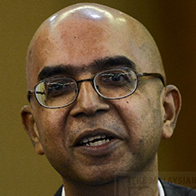On Saturday, I learned that there is neither a word nor a term in the Quran which can be translated “Islamic state.”
That fact was attested by Dr Dzulkefly Ahmad, a self-acknowledged Malaysian Islamist who urges adoption of the Kelantan Shariah Criminal Code; Dr Farouk Musa, a Malaysian Muslim activist; and Dr James Piscatori, professor of international relations in Durham University, UK.
Piscatori gave a lecture titled “Islam and the secular state” in the Law faculty in University Malaya. Dzul responded.
In his response Dzul included an off-the-cuff definition of “Islamist”. I couldn’t grasp what he said, so when I got home I looked it up.
I learned that the AP (Associated Press) style guide defines an Islamist as “an advocate or supporter of a political movement that favours reordering government and society in accordance with laws prescribed by Islam”.
So, it seems that every Islamist has to answer the question “what laws are prescribed by Islam"?
Going by discussions I have heard between Muslims in recent months, it seems there is little consensus among Muslims over how to answer this question.
Except for one thing: in Malaysia, an answer was agreed in 1957.
In 1957 our forebears decided that laws pertaining to family – for example marriage, adoption, divorce, inheritance and charitable trusts – will be different for Muslims than for non-Muslims.
That explains our “for Muslims only” shariah courts and List II: State List (Article 95B (1) (a) in the Ninth Schedule at the end of the Federal Constitution.
It’s not hard to discern what our forebears had in mind, vis-a-vis the role of Islam in the nation.
The constitution has 16 parts, each with a short title. None of the short titles includes the word “Islam” or “Muslim.”
None of the chapter and article headings in the constitution include either the word “Islam” or the word “Muslim.”
Malaysian Islamists say there is much injustice in our society. They say that God, in the Quran, has shown that implementing shariah laws including hudud (maximum punishments such as amputation and stoning) will free us.
Islamists seem to miss the most obvious facts.
Islamists seem not to notice that in Malaysia a Muslim Attorney-General practises selective prosecution and that a Muslim Inspector-General of Police practices selective detention and investigation. Why would shariah prosecution and investigation be different?
Islamists seem not to notice that there is no consensus amongst themselves. For instance, within PAS, the Islamic party, there are “progressives” and there are “hard-liners.”
Islamists seem not to notice that there is no agreement among mankind about most things. For instance, Christians have stopped counting the number of their denominations.
If Islamists respond to factionalism in other faiths as “well, that’s because they’re non-Muslims”, then they choose not to notice divisions in their own faith.
Aren’t members of al-Qaeda and Islamic State of Iraq and Syria (Isis) Muslims? Weren’t both sides in the Iran-Iraq war Muslim? Aren’t the ever-bickering Umnoputera and PAS leaders Muslims?
Perhaps “are they Muslims?” is the wrong question. Perhaps the more important question, picking up from what Dzul said, is “are they Islamists?”
In 2007, Mehdi Mozaffari, (currently a professor at Aarhus University in Denmark) proposed a definition of “Islamism” (Islamiyyun). Before revealing his definition, he recounted its usage since 1697.
He noted: “The Quran uses the terms Muslimun along with Mu’minun [Believers], never Islamiyyun. Islamic classical works generally respect the Qur’anic terminology. Theologians from the four prevailing schools (Hanafi, Maliki, Shafi’i and Hanbali) use Muslimun and Muslim, not Islamiyyun.”
Mozaffari identified the Sudanese Hasan al-Turabi (b. 1932) as one of the first to use Islamiyyun (Islamist) in his writings.
Mozaffari also noted the vast number of groups which emerged within Islam: “Sunni (various schools) v Shia (different sects), Mujahid [Combatant] vs Munafiq [Hypocrite], Khariji, [’Excommunicated’], Mu’tazili ['Rationalists’], Usuli [Theological Fundamentalist] vs Akhbâri [believing that the tradition of the prophet provides sufficient guidance], and finally, in the Iranian context, Khodi [Insider] vs Na khodi [Outsider]. . . Muslim authorities who are against Islamists often call them Irhabiyyun [Terrorists] or Mutatarrifun [Extremists].”
Mozaffari offered this definition of Islamism: “a religious ideology with a holistic interpretation of Islam whose final aim is the conquest of the world by all means” and added “’Clerical fascism’ is perhaps the nearest concept. . . to Islamism.”
I’m not a Muslim, but Islamists want to change the fabric of my nation. Some of them say they want to use the democratic means of persuasion to implement the “Islamic state” in Malaysia. They want to set aside the decision about Islam which our forebears embodied in our constitution.
The more I listen to Islamists, the less convinced I am that they are more rightly guided than the framers of our constitution. – June 18, 2015.
* This is the personal opinion of the writer or publication and does not necessarily represent the views of The Malaysian Insider.


Comments
Please refrain from nicknames or comments of a racist, sexist, personal, vulgar or derogatory nature, or you may risk being blocked from commenting in our website. We encourage commenters to use their real names as their username. As comments are moderated, they may not appear immediately or even on the same day you posted them. We also reserve the right to delete off-topic comments